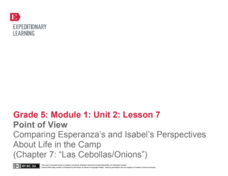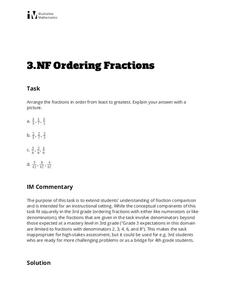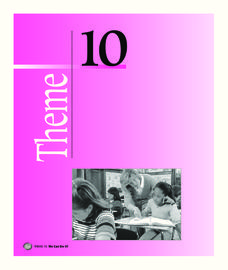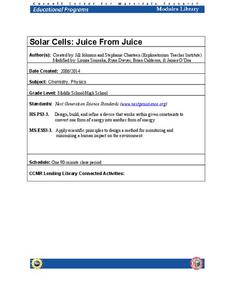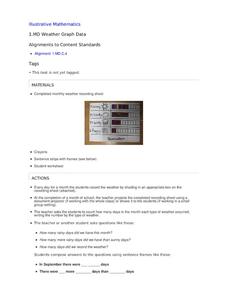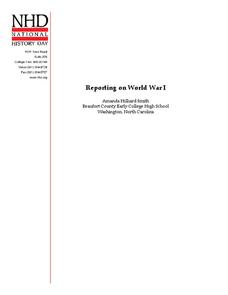Common Core Sheets
Comparing Numerical Fractions (Same Numerator or Denominator)
Compare two fractions with like denominators or like numerators in an excellent skills practice worksheet. With 10 sets of worksheets, the packet uses numbers and visual models to help young mathematicians determine greater than, less...
Curated OER
Compare and Contrast Night to Life is Beautiful
After reading Elie Wiesel's Night, watching the movie Life is Beautiful, and researching World War II, class members write a comparison essay on the book and film. This includes a prior knowledge activity, discussion in whole and small...
Illustrative Mathematics
Which Weighs More? Which Weighs Less?
Expand the the comparative language of young mathematicians with a hand-on weight measurement activity. Working independently or in pairs, children compare the weight of large wooden blocks to various other classroom objects, recording...
EngageNY
Point of View: Comparing Esperanza's and Isabel's Perspectives About Life in the Camp (Chapter 7: "Las Cebollas/Onions")
Explore point of view and more with a Common Core-designed instructional activity. Learners experience different points of view by representing one of two characters from Esperanza Rising during a partner discussion. They must use...
Curated OER
Use Google Maps to Teach Math
Capture the engagement of young mathematicians with this upper-elementary math lesson on measuring time and distance. Using Google Maps, students first measure and compare the distance and time it takes to travel between different...
EngageNY
Part of a Whole as a Percent
Pupils use visual models, numeric methods, and equations to solve percent problems. To complete the second installment of 20, they find the part given the percent and the whole, find the percent given the part and the whole, and find the...
Illustrative Mathematics
Ordering Fractions
Here is a comparing and ordering fractions learning activity that extends young mathematicians understanding of fractions with like and non-like denominators. By representing and explaining each fraction in a picture or diagram, students...
Curated OER
Fraction City
Welcome to Fraction City! This is an incredibly interactive and fun way to teach properties of fractions, and reaches multiple learning styles. Scholars create "blocks" by folding strips of paper in various increments (thirds, fourths,...
Houghton Mifflin Harcourt
We Can Do It!: Extra Support Lessons (Theme 10)
Scholars participate in chants, grand discussions, and complete practice pages in a We Can Do It! themed unit. Designed to provide extra support, the assortment of lessons cover topics such as r-controlled vowels, comparatives and...
Houghton Mifflin Harcourt
Fraction Strips
Identify, compare, and order fractions with a hands-on learning tool. Fraction strips are a great way to help young mathematicians understand and visualize fraction values. The worksheet can be made into an activity in which pupils cut...
Houghton Mifflin Harcourt
We Can Do It!: English Language Development Lessons (Theme 10)
English language development lessons are brought to you in poems, picture cards, and grand discussions in a We Can Do It! themed unit. Topics of discussion include daily challenges, parts of a whole, words that describe what we hear,...
Illustrative Mathematics
Sort and Count II
Capture the engagement of young mathematicians with this hands-on sorting activity. Given a bag of objects, learners work independently sorting the items based on their physical attributes, counting to determine the size of each group....
Anthropological Association
Race: Teacher Guide: Race
How has the concept of race changed over time? Explore the genetic, cultural, and social aspects of race through a series of impactful activities. Scholars discover how race is influenced by inherited traits, examine census records to...
Cornell University
Isotope Rummy
Thanks to this game, teaching isotopes will never be the same. Physical science scholars work their way toward understanding isotopes in an entertaining game. Pupils play rummy in groups while practicing good sportsmanship and creating...
Mary Pope Osborne, Classroom Adventures Program
Mummies in the Morning Egyptian pyramids, hieroglyphics
Visit the Magic Treehouse and take your class on a trip through time with a reading of the children's book Mummies in the Morning. Using the story to spark an investigation into Egyptian culture, this literature unit engages...
Los Angeles Unified School District
Capitalism and Socialism
Capitalism, socialism, communism ... these may seem like a whole bunch of isms to your scholars. High schoolers won't confuse them after completing an informative resource. Your class masters how to use primary sources to critically...
Cornell University
Solar Cells: Juice From Juice
Unleash the power of ... blackberries! Science superstars create solar cells using the juice of berries or leaves of a citrus tree in an engaging lab. In addition to offering a plethora of resources, the teacher's guide gives background...
Illustrative Mathematics
Weather Graph Data
Teaching young mathematicians about collecting and analyzing data allows for a variety of fun and engaging activities. Here, children observe the weather every day for a month, recording their observations in the form of a bar graph....
Association of American Geographers
Project GeoSTART
Investigate the fascinating, yet terrifying phenomenon of hurricanes from the safety of your classroom using this earth science unit. Focusing on developing young scientists' spacial thinking skills, these lessons engage learners in...
Friends of Fort McHenry
Cannons During the War of 1812
During the Battle of Baltimore in the War of 1812, only 25% of the bombs and rockets fired at Fort McHenry actually reached their target. Using an interactive online simulation, combine your historical study with physics and discover why...
Howard Hughes Medical Institute
Measuring Biodiversity in Gorongosa
Take your biology class' understanding of biodiversity to a whole new level! Ecology scholars use data to calculate three different diversity indices based on the organisms in the Gorongosa National Park. The four-part activity uses an...
National History Day
Reporting on World War I
Throughout history, newspapers have reported the events of the day as they unfolded. Using primary and secondary sources from World War I, scholars uncover how the American people learned of the events of the War to End All Wars. History...
NET Foundation for Television
1850-1874 Homestead Act Signed: The Challenges of The Plains
Start a whole new life in a land known as the Wild Wild West! Learners analyze maps, personal accounts, the Kansas-Nebraska Act, songs, and video clips to uncover life under the Homestead Act. Using their new skills, class members role...
Pace University
Urban Communities
Urban communities are the focus of a series of lessons created to meet specific needs using differentiated instruction. A pre-assessment designates scholars into three groups based on their ability level. Small groups take part in...





